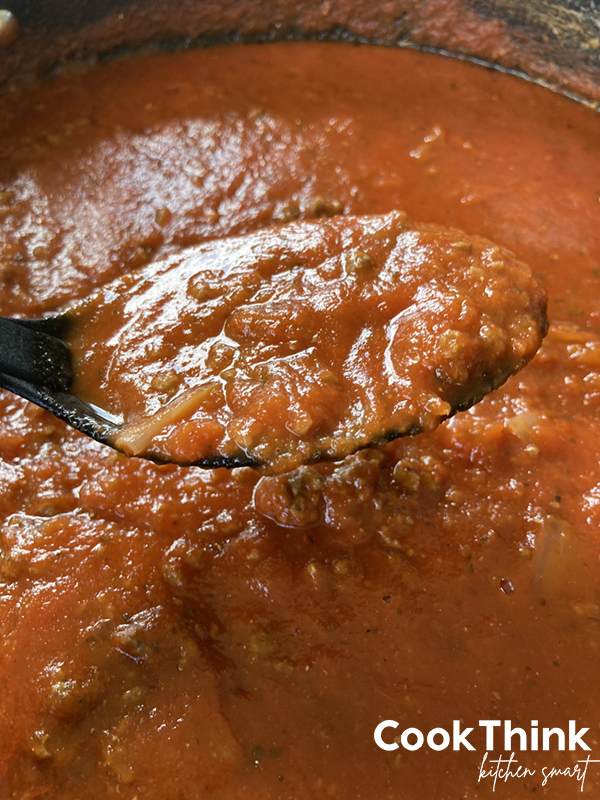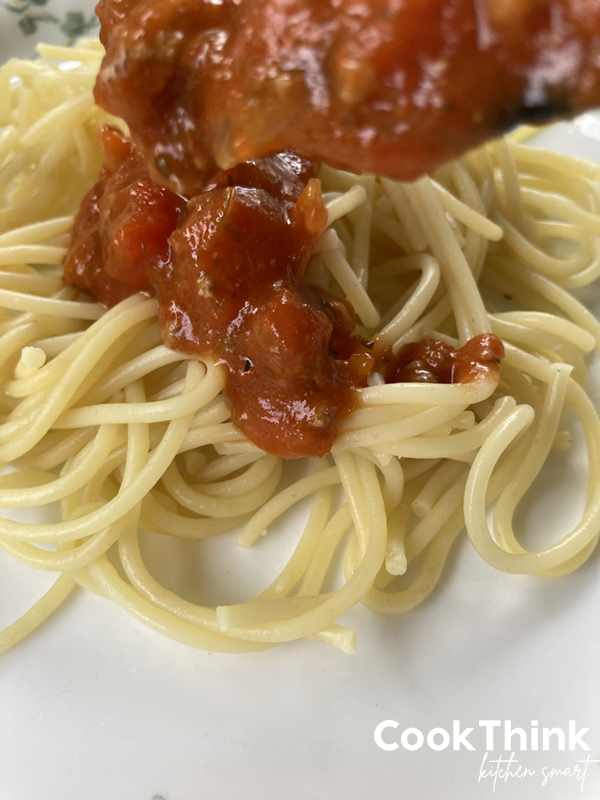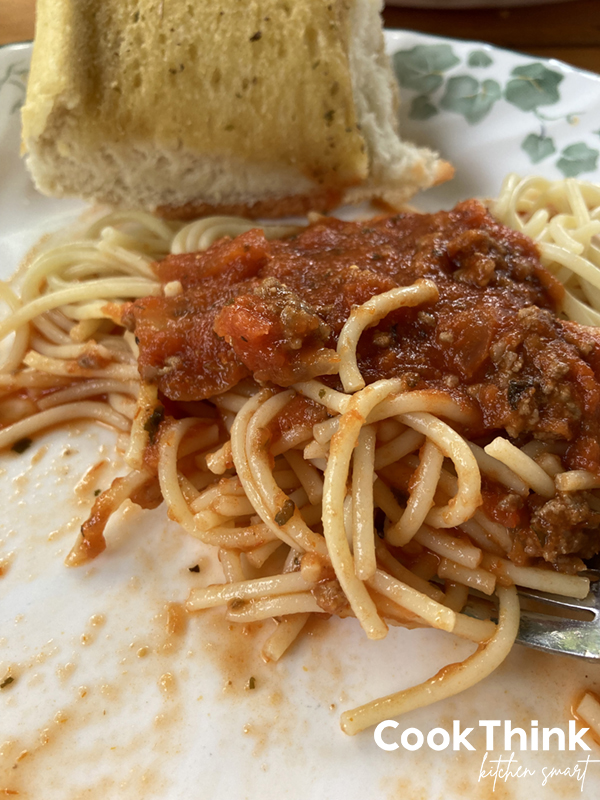Perhaps you’ve opened a jar of pasta sauce and it’s thinner than you’d hoped. Or, maybe your homemade pasta sauce is more watery than anticipated. We’ll give you the top 12 best options for how to thicken pasta sauce as well as answer some frequently asked questions.

Why Isn’t My Pasta Sauce Thick?
There can be various causes of watery spaghetti sauce. The number one reason is that moisture content from vegetables can create excess liquid.
Or if the pasta sauce didn’t simmer and reduce long enough, there can be too much liquid.
Whatever the cause, we’ll help you resolve the issue and thicken it to your desired consistency.
Marinara vs Spaghetti Sauce
Marinara and spaghetti sauce are similar but slightly different and in some cases, they can be used interchangeably depending on one’s preference or ultimate goal.
Both marinara and spaghetti sauce are tomato-based sauces for pasta. And they both include seasonings for additional flavor.
The difference comes into play in that spaghetti sauce typically has additional ingredients such as meat or vegetables, whereas marinara sauce doesn’t.
How To Make Thick Tomato Sauce
The key to making thick tomato sauce is letting it simmer long enough so that it becomes thick. Cooking it over low heat for a length of time reduces it and thickens its consistency.

What Is Spaghetti Sauce?
Spaghetti sauce is a tomato based sauce that traditionally includes seasonings as well as vegetables and meat. It can be used to go on top of spaghetti pasta noodles.
Does Spaghetti Sauce Need to Be Thick?
Whether spaghetti sauce needs to be thick is a matter of personal preference. But traditionally speaking, spaghetti sauce tends to be on the thicker, darker rich red side. This is achieved by allowing the sauce to simmer over low heat and reduce over time.
How to Thicken Pasta Sauce (11 Simple Ways)
Following are our top 11 ways to thicken spaghetti sauce, the Italian secret to getting your sauce just right. You can choose the desired method according to your preference and available ingredients. We’ll show you how to thicken sauce with a trick that works for any meal.

1.Simmer Your Sauce
Did you know that simmering your sauce over a low heat, without a lid, allows the excess moisture to evaporate? You’ll want to be patient with this method as it can take a bit of time for the consistency to change and the reduction to take place.
The key with this method is to be patient and stir the mixture regularly so it doesn’t burn. This method works especially well with a tomato-based sauce.
2. Add a Roux
For how to thicken pasta sauce with flour, adding a roux can come in especially handy in cream-based pasta sauces as well as cheesy pasta sauces. It can be used in tomato sauces as well. It’s a popular method for how to thicken pasta sauce without cornstarch.
For how to make a roux, you’ll need butter and all-purpose flour. To make the roux, melt ¼ cup of butter in a saucepan. Then sprinkle ¼ cup flour in the melted butter and cook for about 1-2 minutes until paste forms. Whisk the mixture into the sauce to thicken it quickly.
If your dietary restrictions require a gluten free diet, you’ll want to use a gluten free all-purpose flour for this method.
3. Add Cornstarch
If your dietary restrictions don’t allow you to consume flour, using cornstarch can be a good alternate solution with similar results. Cornstarch is known as a thickening agent and works well for thickening pasta sauces.
For how to make a cornstarch slurry, you’ll want to use a 2 to 1 ratio of water and cornstarch.
To make the cornstarch slurry, add the water to cornstarch and whisk until it’s dissolved. Whisk the mixture into the pasta sauce. Let it simmer while stirring occasionally and it should thicken quickly. Cornstarch is an excellent option for how to thicken spaghetti sauce without tomato paste.
4. Add Mashed Potatoes
Using instant mashed potatoes can help thicken your pasta sauce. Whether your pasta sauce is tomato based or cream based, instant mashed potatoes will provide a thicker consistency to the sauce.
Begin by adding ¼ of instant mashed potatoes, stir and let simmer for about 2-3 minutes until thickened. Add more if needed.
5. Cook Your Pasta in the Sauce
Another way to end up with a thicker sauce is to cook your pasta right in the sauce. This will allow the starch from the pasta to naturally thicken the pasta sauce.
You’ll want to plan from the start to use this method. In other words, you won’t want to cook the pasta in water first then transfer it to the sauce. It’s better to start it out cooking in the sauce.

6. Add Vegetables
Adding vegetables can help to thicken the consistency of your pasta sauce. Adding items such as shredded carrots, eggplant, or sautéed onion can make the consistency fuller.
7. Add Ground Beef or Sausage
Adding ground beef or ground sausage can help change the texture and flavor of the sauce, making it seem thicker. Adding ground meat also adds protein, which can be an additional benefit.
If you prefer ground chicken, turkey or venison for dietary restrictions, these can also be a good way to thicken pasta sauce.
We recommend cooking any meat fully before adding it to the pasta sauce for food safety reasons. The quantity of ground meat added to pasta sauce can vary based on your personal preference.
8. Add Egg Yolks
Adding egg yolks works especially well to thicken any cream-based pasta sauces. To do this, start by using 2 egg yolks and whisking them thoroughly until they’re smooth before adding them to your pasta sauce.
Add them to your sauce and continue whisking until they’re incorporated. The important thing about using egg yolks is you’ll want to be sure that they’re fully cooked before they’re consumed.
You can be sure of this by using a food thermometer and checking the temperature to be sure it reaches 165F degrees before removing it from the heat.
9. Heavy Cream
Heavy cream can also be used to thicken pasta sauce. We give it a high recommendation for cheese-based sauces. When heavy cream and cheese are heated together, they bond and thicken the mix.
While some might ask, can you use milk in place of heavy cream, while it’s fine in some recipes, we don’t recommend it for the purpose of thickening pasta sauce as the results aren’t as effective.
10. Thicken With Cheese
Using cheese is another way to thicken pasta sauce. For example, if your goal is to thicken alfredo sauce, you could add parmesan cheese, mozzarella cheese, or Italian cheese to the mix and help increase the consistency to make it thicker.
We recommend starting out with ¼ cup at a time, allowing the sauce to simmer, and stirring it regularly so that it’s fully incorporated before adding more cheese. It’s best to choose a type of cheese that has a similar color and flavor profile as the pasta sauce does.
11. Pasta Water
Starchy pasta water works well to thicken any kind of pasta sauce. The starch content from the water used to boil the noodles is effective as a thickening agent.
We recommend it for how to thicken pasta sauce without cream.
For how to use starchy pasta water, bring your pasta to a boil, cook it until it’s al dente. Then, remove 1 cup starchy pasta water and reserve it for potential use.
Begin by adding 1/4 cup of pasta water to your pasta sauce and bring to gentle boil. Reduce the heat and allow the sauce to simmer until it thickens. Stir regularly to keep the sauce from burning.

How to Thicken Pasta Sauce (Best Ways to Thicken Your Italian Sauce Like a Pro)
Following are our step by step instructions for how to thicken spaghetti Sauce.
Ingredients
Spaghetti Sauce
Instructions
1. Roux. To thicken your pasta sauce with a roux, use ¼ cup butter and ¼ cup flour. Melt the butter in a saucepan over medium heat, whisk in the flour until it creates a paste. Add this to your pasta sauce and stir until well combined. Heat until thickened.
2. Cornstarch Slurry. Mix ¼ cup water and 2 teaspoons of cornstarch. Whisk until smooth and well combined. Add to pasta sauce and let simmer, stirring regularly until thickened.
3. Pasta Water. Use ¼ cup pasta water. Let simmer until thickened. Add more pasta water if needed.
Frequently Asked Questions
Following are frequently asked questions that relate to how to thicken pasta sauce. If you have a question that’s not answered here, please submit it to us in the comments box below and we’ll be happy to answer it.
What are 3 ways to thicken a sauce?
Our top 3 recommended ways to thicken pasta sauce are to use a roux, pasta water, or cornstarch slurry. We’ve also listed other effective methods above.
How do you thicken pasta sauce without cornstarch?
There are a variety of methods that can be used to thicken pasta sauce. See our complete list above. We recommend creating a roux or using pasta water to thicken pasta sauce without cornstarch.
Why won’t my pasta sauce thicken?
Chances are that your pasta sauce won’t thicken because there’s too much liquid and not enough starch. You’ll likely need to raise the starch level for the sauce to thicken.
Does adding pasta water thicken sauce?
Yes, adding pasta water will help the sauce thicken. You’ll want to let the sauce simmer after the pasta water is added.
How to thicken spaghetti sauce in a crockpot?
Some prefer to use the crockpot method to thicken their spaghetti sauce. Using the crockpot does, however, take longer than letting the mixture simmer and thicken on the stovetop.
You can set the spaghetti sauce on low heat and let it simmer over the course of the day. Be sure to stir it periodically so it doesn’t burn.

Can flour thicken spaghetti pasta sauce?
Yes, you can use all-purpose flour in a roux, using our instructions above, to thicken spaghetti pasta sauce.
Is spaghetti sauce gluten free?
Generally, spaghetti sauce is gluten free. It’s traditionally made with tomatoes, other various vegetables, and seasonings.
Are spaghetti sauce and pizza sauce the same?
The obvious thing that they have in common is both are made using a tomato base.
While pizza sauce generally has a thicker consistency which helps to prevent the pizza’s crust from turning soggy, tomato-based pasta sauce is generally thinner. You can learn more in our post titled Pizza Sauce vs. Pasta Sauce.
Can spaghetti sauce be used for pizza?
Yes, in a pinch spaghetti sauce can be used for pizza as it has a similar flavor, but it will be more watery.
Does spaghetti sauce go bad?
Yes, like any perishable food, spaghetti sauce will go bad. Unopened spaghetti sauce in the jar is good for about a year but check the best if used by date as a guideline.
Sauce that’s been opened can last for up to 4 days in the fridge. If you notice any signs of mold or discoloration, you should not eat the spaghetti sauce.
Can spaghetti sauce be frozen?
Yes, spaghetti sauce can be frozen, just place it in a zipped freezer bag or in a freezer safe airtight container. Be sure to date and label the contents.
More Favorite Pasta Recipes
California Pizza Kitchen Garlic Cream Fettuccine Recipe
Ultimate Chicken and Broccoli Pasta Cheesecake Factory Copycat
Panera Chicken Tortellini Alfredo Copycat Recipe
Save to Pinterest:

For more posts like this one, follow us on Pinterest, Facebook, Instagram and YouTube.

